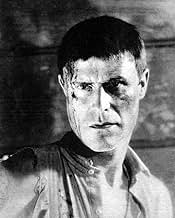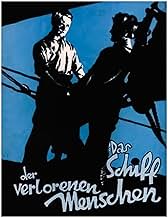Agrega una trama en tu idiomaVela, cynical captain of a slow, decrepit sailing ship, sells passage out of Germany to fugitives. His crew are no angels either. Cheyne, a young American doctor visiting the ship, is shangh... Leer todoVela, cynical captain of a slow, decrepit sailing ship, sells passage out of Germany to fugitives. His crew are no angels either. Cheyne, a young American doctor visiting the ship, is shanghaied on a 3-month voyage to Brazil when Vela abruptly embarks. In mid-ocean, Cheyne rescue... Leer todoVela, cynical captain of a slow, decrepit sailing ship, sells passage out of Germany to fugitives. His crew are no angels either. Cheyne, a young American doctor visiting the ship, is shanghaied on a 3-month voyage to Brazil when Vela abruptly embarks. In mid-ocean, Cheyne rescues the survivor of a watery plane crash, lovely American heiress Ethel Marley; he and the s... Leer todo
- Dirección
- Guionistas
- Elenco
- Grischa - der Koch - the Cook
- (as Wladimir Sokoloff)
- Nick
- (as F. Schaljapin)
- Dirección
- Guionistas
- Todo el elenco y el equipo
- Producción, taquilla y más en IMDbPro
Opiniones destacadas
If you are a fan of Dietrich, fast-forward to her bits. The soundtrack is equally awful lol!
Marlene flat out lied about not acting on silent movies, she never thought we'd see this some day 😛
Quite easily it turns out. This might have clocked in at a satisfactory 80 minutes, but instead the cast for the most part aimlessly mill about for over two hours. Dietrich's role is effectively a sub-plot; she only comes aboard over a third of the way in, and it then takes another half-hour for the crew to find out. She thereafter proves a disappointingly passive heroine as the crew career about in search of her, and her final appearance in the film is in extreme long shot. The big close-up at the end instead goes to the resourceful ship's cook, Vladimir Sokoloff, who has admittedly earned it by giving the film's best performance.
The story, from the novel by Franzos Keremen, is a commentary on Jack London's SEA WOLF. London's Wolf Larsen is a Nietzschean philosopher. The captain, in this movie, is a schemer among brutes -- a correction to London's drunken maunderings that might have served humanity better. It is the gentle cook, played by Vladimir Sokoloff that is the real hero of the story after the crew mutinies and kills the ship's master.
The movie also stars Marlene Dietrich, a few months before von Sternberg supposedly plucked her from obscurity. She looks a lot like Claudette Colbert in this movie and shows her command of film acting already. Very highly recommended.
Selecciones populares
Detalles
- Tiempo de ejecución2 horas 1 minuto
- Mezcla de sonido
- Relación de aspecto
- 1.37 : 1
Contribuir a esta página


























